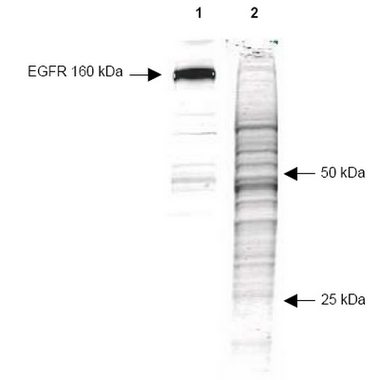Phosphotyrosine Mouse Monoclonal Antibody [Clone ID: 13F9]
Specifications
| Product Data | |
| Clone Name | 13F9 |
| Applications | ELISA, WB |
| Recommended Dilution | This monoclonal antibody reacts specifically with phosphotyrosine and shows minimal reactivity by ELISA and competitive ELISA with phosphoserine or phosphothreonine. The antibody reacts with free phosphotyrosine, phosphotyrosine conjugated to carriers such as thyroglobulin or BSA, and detects the presence of phosphotyrosine in proteins of both unstimulated and stimulated cell lysates. Although not tested, this antibody is likely functional in RIA, Flow cytometry, Immunohistochemistry and Immunoprecipitation. Phosphorylation of tyrosine residues is associated with many growth factors and oncogene protein kinases, and is important for cell signaling in activation, proliferation and differentiation. Recommended Dilutions: This product was assayed by against phosphotyrosine conjugated BSA by ELISA using HRP Goat-anti-Mouse IgG for detection. A working dilution of 1:2,000 to 1:10,000 is suggested for this assay. For Immunoblotting dilute the antibody 1:1000 immediately before use. |
| Host | Mouse |
| Isotype | IgG1 |
| Clonality | Monoclonal |
| Immunogen | This monoclonal antibody was produced after repeated immunizations of balb/c mice with phosphotyrosine conjugated KLH. |
| Specificity | This product is clarified ascites produced in balb/c mice using clone 13F9. Reactivity is specific for phosphotyrosine and minimal cross reactivity is observed against phosphoserine or phosphothreonine. |
| Formulation | PBS buffer with 0.02% sodium azide as preservative. State: Ascites State: Liquid (sterile filtered) ascites. |
| Conjugation | Unconjugated |
| Storage | Store the antibody (undiluted) at 2-8°C for one month or (in aliquots) at -20°C for longer. Dilute only prior to immediate use. Avoid repeated freezing and thawing. |
| Stability | Shelf life: One year from despatch. |
| Note | Hybridoma: Produced by the fusion between mouse splenocytes and mouse myeloma SP2/0 cells using conventional hybridoma technology. |
| Reference Data | |
Documents
| Product Manuals |
| FAQs |
| SDS |
{0} Product Review(s)
0 Product Review(s)
Submit review
Be the first one to submit a review
Product Citations
*Delivery time may vary from web posted schedule. Occasional delays may occur due to unforeseen
complexities in the preparation of your product. International customers may expect an additional 1-2 weeks
in shipping.






























































































































































































































































 Germany
Germany
 Japan
Japan
 United Kingdom
United Kingdom
 China
China




